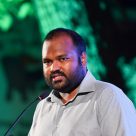
Ali Waheed
Minister of Tourism
Tourism / Maldives
“We demand from investors economic and environmental sustainability”
The ministry of tourism, in charge of the largest national economic sector is raising standards of sustainability for all new resorts. Tourism minister Ali Waheed shares his expectations.
What will change in your mandate for the tourism sector?
The first thing we did upon assuming office was to challenge the general perception of the ministry as a place plagued by corruption, where decisions were taken without oversight. Six months into our government, there hasn’t been a single accusation against this ministry. That is because we implemented the approach of bringing everyone together to take decisions and made all processes more transparent. Regarding the sector itself, we have started to update regulation and we are developing a wide-reaching campaign to expand mid-income tourism. Things are changing. We are back in the charts of the world and we are looking at very prosperous five years ahead.
How will your ministry reconcile tourism success with environment protection?
It’s all down to the policy lines of the new government. We have stopped using single-use plastic, and we are moving away from plastic entirely. We have also raised the bar on sustainability demands for new resorts, and we have restructured the green tax coming from tourists and resorts, which will fund green developments. With the green tax, gathered in a green fund, local councils can apply with proposals to improve the environment in their islands. Until now, these funds were diverted through the ministry of finance and at times used for other ends. We have now assured transparency in that process, so we have the means to build a sustainable economy.
What does this mean for new investors?
When I first took over this portfolio, there were 20 islands on sale for resort development. We put a halt to that process because there was no development planning and no regard for long-term sustainability. Henceforth, we only attribute islands for development if they fit within our sustainability planning. We already have 14 new resorts coming this year. Many islands already suffer the results of pollution and inadequate waste management, and we want to address this issue swiftly and efficiently. Both for environmental and economic reasons, we need to be more sustainable. In contrast to previous administrations, we do not discriminate between nationalities or types of foreign investors. We want people to come and feel safe investing in our economy. What we demand from investors is economic and environmental sustainability, nothing else.
How do you intend to promote the growth of mid-income tourism?
In a number of different ways. We have launched the SME bank earlier this year, which will assist in financing smaller guest-house projects so that all Maldivians can take part and earn from the tourism industry. This is also the base to open the country to different types of travelers. Across the world, people perceive the Maldives as a high-end expensive destination for the rich. That is not true, and there are now many affordable options for people to come and visit our beautiful country.
What does this mean for new investors?
When I first took over this portfolio, there were 20 islands on sale for resort development. We put a halt to that process because there was no development planning and no regard for long-term sustainability. Henceforth, we only attribute islands for development if they fit within our sustainability planning. We already have 14 new resorts coming this year. Many islands already suffer the results of pollution and inadequate waste management, and we want to address this issue swiftly and efficiently. Both for environmental and economic reasons, we need to be more sustainable. In contrast to previous administrations, we do not discriminate between nationalities or types of foreign investors. We want people to come and feel safe investing in our economy. What we demand from investors is economic and environmental sustainability, nothing else.
How do you plan to address emerging safety and security issues?
We have launched an information campaign regarding the safety concerns that exist, but to be sure, the safety and security standards in resorts are very high. The issues with people having accidents at sea and drowning are isolated and we investigate every single one. None was ever judged to be caused by a lack of safety features in the resorts. We are looking into sensibilization campaigns and speaking with the sector stakeholders to address these issues, including the Maldives Police Service, the Maldives National Defense Force, and the Maldives Association of Tourism Industry. Our teams are inspecting every tourist facility for safety. There is no reason for concern, but with so many guest-houses coming in, which is new for this country, we have to regulate and oversee. We are starting a campaign, in different languages, to signal where it is safe to swim, and how to account for currents and tides. Inspections will be concluded by September 2019, when we will have a better picture of what the issues are and how to address them. However, it is important to understand that this country is 99 percent composed by water, and people should make sure they know how to swim when going into the sea.
